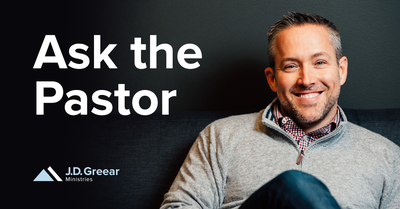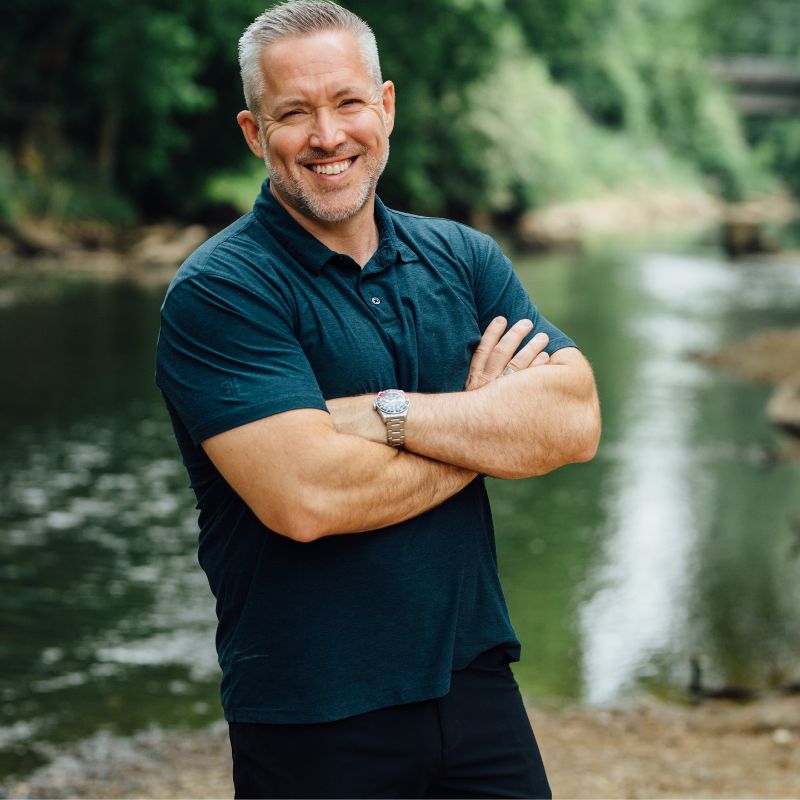God Delivers Us from Our Sins and the Sins of Others
Ask the Pastor with J.D. Greear


Audio By Carbonatix
By J.D. Greear, Crosswalk.com

After seminary, I lived for a few years in Southeast Asia. I received one week of language training before I was dropped off in a city 100 miles away from the nearest English native-language speaker. The only three phrases I felt really confident in saying were: “Hello, my name is J.D.”, “Where is your bathroom?”, and “My house is on fire.” I figured that covered all of the most urgent issues. The rest I learned on location.
If you’ve ever learned another language, you know it’s really easy to make a lot of embarrassing mistakes, because a lot of words have nuances and usage rules that aren’t really communicated by the dictionary. For example, I heard someone use the word “cium,” so I wrote it down in my little notebook. I looked it up later and saw it meant “to smell,” so I wrote that definition down beside the word. Then, as my language teachers were always encouraging me to do—I looked for opportunities to use this new word.
That very evening, I was with a friend who had given his daughter some perfume for her birthday, and when she walked into the room, it was obvious she was wearing it. So trying to be polite and make conversation, I said, “Your daughter ‘cium’ very good.” I was going for, “She smells nice.” But when I said that, I noticed my friend’s expression change. Apparently, in that context, the word “cium” was a euphemism for “kiss.” “Sir, your daughter kisses very well.” Fortunately, instead of punching me in the nose, he assumed I was confused. He and I had an awkward conversation trying to figure out what I was trying to say. And once he figured it out, he actually got the biggest kick out of it.
Another time, I was trying to say “sneeze,” which is “bersin,” but instead I said “bersina,” which means “commit adultery.” I won’t even tell you the situation that mistake created, but whatever you imagine, the real story is worse. (I still don’t think it’s fair that those two words are that close. Asking for trouble!)
One other word that didn’t really translate well into the language was “salvation,” primarily because I was living in a Muslim context, and the people didn’t really have a concept of salvation. They had a word for “rescue,” but it implied different things than our understanding of “salvation,” so every time I used the word, I’d have to give two or three sentences of explanation with it.
The book of Exodus is the story form of what “salvation” is. In fact, did you know that the first time the word “salvation” is used in the Bible is in Exodus 15? And every time God would remind Israel of his salvation after Exodus, it’s the events of Exodus that he points back to. Exodus plays the first melody of salvation in Scripture, and the rest of the Old Testament offers variations on that main theme.

It’s hard to imagine a clearer illustration of our salvation than what we see presented in Exodus’s opening pages. God raised Moses to rescue the people from their bondage, a bondage that we are supposed to read as a picture of what sin does to us. Look at Exodus 1:13–14, for instance, where three separate English words —“work,” “service,” and “slave”—are all doing the work of one Hebrew word, “abad.” It’s a literary device designed to give these verses a monotonous tone: “So they ruthlessly made the people of Israel [abad] as [abad] and made their lives bitter with [abad], in mortar and brick, and in all kinds of [abad] in the field.”
Sin almost always starts out enjoyably, but it turns into monotony, never fully delivering on what it promised. And then it turns destructive. Pharaoh, their captor, started to literally murder them. That’s what sin does. Pornography starts as a secret habit, maybe even one that you enjoy. But then it becomes a habit that you are ashamed of. Soon, it becomes an addiction you can’t control. Finally, it destroys your relationship with your spouse and starts to change how you see people of the opposite sex. Jesus said it plainly in John 10:10: “The thief comes to kill, steal, and destroy.”
Satan doesn’t lead with destruction, of course. No hunter leads with destruction. He leads with bait. You enjoy sin, for a while, while your soul becomes numb to the wounds it inflicts upon you as you lacerate your soul to shreds.
You say, “Wait a minute, Israel’s slavery sounds pretty unjust. You’re making it sound like it was their fault.” Well, in one sense, it was: The sons of Israel were in Egypt, after all, because they’d sold Joseph into slavery. That act represents how all of us end up in bondage to sin because we failed to trust and obey God. But, I will concede that, on a human level, this slavery was unjust, and that reveals another aspect of our salvation: Moses rescued the people from Pharaoh’s oppression.
Some of you have suffered, not because of your own sin, but because of sins committed against you—horrible sins. Neglect. Betrayal. Abuse. Your parents, a friend, a teacher, an older brother, a spouse—someone harmed you. If that’s you, Exodus stands as a reminder that there’s a God ready to lead you out of this captivity of oppression. He’s ready to redeem you and heal you and set you free. He is as angry with the injustices committed against you as he was angry with Pharaoh for oppressing his people.
The good news is, you can walk in freedom and newness of life and blessing—but you’ve got to accept God’s offer to do so. You may legitimately be a victim. But you don’t have to remain a victim your whole life. That doesn’t have to become your identity. Listen: It wasn’t your choice to be hurt the way you were, but it is your choice what you do with that pain today. The oppressive spirit of Pharaoh would love to have you stay stuck in shame. But the liberating voice of Jesus offers you freedom, victory, and a renewed life of dignity in him.
Whether you are in bondage because of your own sin or because of what others have done to you, today can be your day of freedom. For those stuck in guilt because of their sin, God extends an offer of forgiveness. For those stuck in shame because of the sins of others, God extends a promise of wholeness and healing.
For all of us, he extends an invitation into salvation—not merely rescue, but a life bursting with freedom, goodness, and peace.
Photo Credit: SWN Design
 J.D. Greear is the pastor of The Summit Church, in Raleigh-Durham, North Carolina. He hosts Summit Life, a 30-minute daily radio broadcast and weekly TV program as well as the Ask the Pastor podcast. Pastor J.D. Greear has authored many books, most notably Gospel, Stop Asking Jesus Into Your Heart, and Gaining by Losing.
J.D. Greear is the pastor of The Summit Church, in Raleigh-Durham, North Carolina. He hosts Summit Life, a 30-minute daily radio broadcast and weekly TV program as well as the Ask the Pastor podcast. Pastor J.D. Greear has authored many books, most notably Gospel, Stop Asking Jesus Into Your Heart, and Gaining by Losing.
Pastor J.D. completed his Ph.D. in Theology at Southeastern Baptist Theological Seminary. He serves as a member of the Board of Directors of Chick-fil-A, serves as a Council member for The Gospel Coalition, and recently served as the 62nd president of the Southern Baptist Convention. Pastor J.D. and his wife Veronica are raising four awesome kids.
"Editor's Note: Pastor JD Greear's "Ask the Pastor" column regularly appears at Christianity.com, providing biblical, relatable, and reliable answers to your everyday questions about faith and life. Email him your questions at requests@jdgreear.com."



























